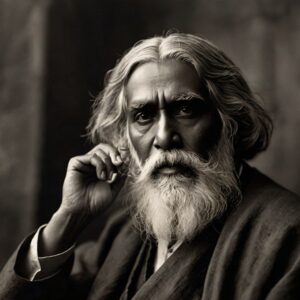At Perspectives Forge, we honor those who have reshaped the landscape of education and culture through their innovative ideas. One such figure is Rabindranath Tagore, a Nobel laureate whose contributions to literature and education have left an indelible mark on society. Born on May 7, 1861, in Calcutta, India, Tagore was not only a poet and philosopher but also a groundbreaking educator who founded Visva-Bharati University. His vision for education emphasized holistic development, creativity, and an intrinsic connection with nature. Let us delve into the life of Tagore, his educational philosophy, and the lasting impact of his ideas on education in India and beyond.

A Renaissance Man: The Life of Rabindranath Tagore
Rabindranath Tagore belonged to a prominent Bengali family and was immersed in the arts from a young age. His father, Debendranath Tagore, was a key figure in the Brahmo Samaj, a socio-religious reform movement in India. This environment fostered Tagore’s creative talents and shaped his worldview.
Tagore’s literary career began early, and he quickly gained recognition for his poetry, which resonated with themes of love, nature, and the human experience. In 1913, he became the first non-European to win the Nobel Prize in Literature for his collection of poems titled “Gitanjali.” However, his influence extended far beyond literature; it was in the realm of education that he sought to create profound change.
Key Contributions to Education
Founding Visva-Bharati University: In 1921, Tagore established Visva-Bharati University in Santiniketan, West Bengal. This institution was not just a university but a vision of an educational utopia where learning transcended traditional boundaries. Tagore aimed to create a global community of scholars, artists, and thinkers who would learn from one another and contribute to a broader understanding of humanity.
Holistic Educational Philosophy: Tagore introduced a unique educational philosophy that emphasized holistic development. He believed that education should nurture not just the intellect but also the spirit and the body. His curriculum incorporated art, music, and physical activities, encouraging students to explore their creative potentials.
Integration with Nature: Tagore emphasized the importance of nature in the learning process. He believed that education should not be confined to classrooms; instead, it should be integrated with the natural world. Students were encouraged to engage with their environment, fostering a deep appreciation for nature and its beauty.
Freedom of Expression: Unlike conventional education systems that relied heavily on rote learning, Tagore advocated for fostering freedom of expression. He encouraged students to think critically, ask questions, and express their ideas freely. This approach promoted a sense of individuality and creativity among learners.
Cultural Awareness and Global Perspective: Tagore’s vision for education extended beyond national borders. He believed in cultivating a global perspective among students, promoting an understanding of different cultures and traditions. This vision was reflected in the diverse student body of Visva-Bharati, which attracted individuals from various backgrounds.
Incorporating Art and Culture: Tagore understood the significance of art and culture in education. He integrated music, dance, and visual arts into the curriculum, allowing students to express themselves creatively. This approach fostered an appreciation for the arts and encouraged students to explore their artistic talents.
Promoting Social Reform: Tagore used education as a means to address social issues. He believed that an educated individual would be more aware of societal challenges and better equipped to contribute to positive change. His educational philosophy aimed to create socially responsible citizens who could advocate for justice and equality.
Literary Contributions to Education: Tagore’s writings, particularly his poetry and essays, explored themes of education and social reform. His works encouraged educators to reflect on their practices and adopt progressive methods that align with his vision for holistic education.
Impact on Education
Rabindranath Tagore’s progressive ideas on education have had a profound and lasting impact on institutions in India and around the world. His methods of incorporating art, culture, and nature into learning environments helped shape modern alternative education models.
Influence on Alternative Education: Tagore’s educational philosophy inspired numerous alternative education models that emphasize experiential learning and creativity. His approach has influenced educators and institutions that prioritize holistic development over standardized testing.
Global Reach: Tagore’s ideas on education transcended geographical boundaries, influencing educational practices in countries beyond India. His emphasis on creativity, critical thinking, and cultural awareness resonates with modern educational movements seeking to foster global citizenship.
Legacy of Visva-Bharati: Visva-Bharati University continues to thrive as a center for artistic and intellectual exchange. It embodies Tagore’s vision of an inclusive educational environment where diverse perspectives are celebrated, and students are encouraged to explore their passions.
Educational Reform Movement: Tagore’s contributions have also played a role in the broader educational reform movement in India. His advocacy for a more inclusive and creative educational system has inspired educators and policymakers to rethink traditional approaches to teaching and learning.
The Philosophy of Rabindranath Tagore
Rabindranath Tagore’s philosophy of education is a profound reflection of his belief that true learning occurs in harmony with nature and the human spirit. He envisioned education as a lifelong journey that nurtures not only the mind but also the heart and soul.
Education Beyond the Classroom: Tagore believed that education should extend beyond the confines of classrooms. He encouraged students to engage with the world around them, fostering a sense of wonder and curiosity. Learning, in Tagore’s view, was an exploration of life itself.
Nurturing Creativity and Spiritual Growth: Tagore emphasized the importance of creativity in education. He believed that education should foster individuality and originality, allowing students to express their unique perspectives. He also saw education as a means of spiritual growth, helping individuals connect with their inner selves and the greater universe.
Empathy and Human Values: Tagore’s educational philosophy was rooted in empathy and compassion. He believed that education should cultivate a sense of responsibility towards society and instill values that promote harmony and understanding among individuals.
Celebrating Diversity: Tagore recognized the richness of diversity in human experience. He believed that education should celebrate differences and promote dialogue between cultures, fostering a sense of unity and respect.
A Call to Action
Rabindranath Tagore’s legacy as an educator and philosopher is a testament to the transformative power of holistic education. His vision encourages us to rethink our approach to teaching and learning, emphasizing creativity, empathy, and a deep connection with nature.
At Perspectives Forge, we invite you to embrace Tagore’s philosophy in your own educational journey. Whether you are an educator, student, or lifelong learner, consider how you can incorporate creativity, critical thinking, and a love for nature into your learning experiences. Let us honor Tagore’s legacy by fostering an educational environment that empowers individuals to explore their passions, think independently, and contribute positively to society. Together, we can create a brighter, more compassionate future—one that reflects the ideals of this remarkable visionary.
